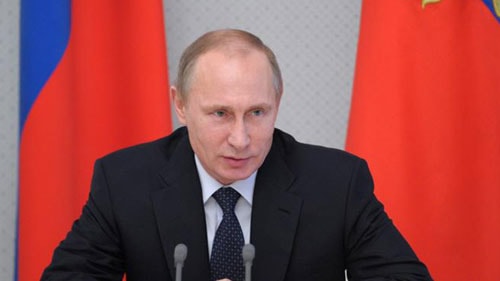On the nuclear issue, be really tough!
(Baonghean) -In March this year, the United Nations Security Council passed Resolution 2094 on implementing sanctions against North Korea for its repeated nuclear missile tests and its many actions in defiance of UN regulations and international public opinion to continue developing nuclear weapons..
Not stopping there, at the end of November, research agencies discovered signs that North Korea was restarting the Yongbyon nuclear reactor. These are the practical and legal bases for the Russian President to officially decide on December 2 to implement sanctions against North Korea.
 |
| Russian President Vladimir Putin. Photo: Reuters |
On December 2, the Kremlin officially announced that President Putin had signed a decree to enact many “strong” measures that will restrict many transactions between North Korea and Russia. Accordingly, Russia prohibits its citizens, organizations and businesses from exchanging goods with North Korea or conducting financial transactions related to North Korea’s nuclear and missile programs. North Korean ships that refuse inspection will not be allowed to enter the port.
In addition, the Russian government is wary of contacts with diplomats from North Korea. According to the decree, Russia will begin monitoring consignments originating from North Korea or suspected of containing prohibited goods. Russia will also restore the right to prevent any aircraft from taking off, landing or transiting in Russian airspace if Russia has information that the aircraft is transporting prohibited goods. In addition, North Korean banks are prohibited from operating in Russia or joint ventures with other Russian financial institutions.
The above sanctions show that, based on the practical and legal basis set forth by the United Nations, Russian President Putin's decision to impose sanctions on North Korea is appropriate. However, considering the traditional relationship from the mid-20th century to the present, this is a rare harsh and cold measure that Russia has taken against North Korea. Before the collapse of the Soviet Union, these countries were all part of the system of developing countries following the path of building socialism. After the collapse of the Soviet Union, although this relationship was not as close as before, there were no signs of opposition or hostility.
Even in many specific situations, although they do not appear openly, there is still a certain tacit support between the two countries. Therefore, it can be seen that President Putin's attitude towards the nuclear issue is very clear and decisive. Mr. Putin clearly shows that the Russian people do not joke about the nuclear issue, and once North Korea does not comply with the law of the United Nations, it is inevitable that they will receive sanctions.
Signing a decree to sanction a country with traditionally good relations is of course a last resort, but Mr. Putin is completely justified, because he has previously taken necessary actions. In November 2013, Mr. Putin urged the restoration of the six-party talks on denuclearization on the Korean peninsula, but North Korea itself has shown a lack of response to Russia's goodwill. Along with that, the International Atomic Energy Agency (IAEA) on November 28 released satellite images showing that North Korea is trying to restart the controversial Yongbyon nuclear reactor. According to IAEA Director General Yukiya Amano, it seems that North Korea is trying to restore the operation of this 5 MW reactor.
After receiving a cold attitude from its closest neighbor, China, the signing of the sanctions decree by Russian President Putin is expected to continue to be a strong "shock" to the North Korean authorities. Hopefully, North Korea will soon make appropriate adjustments to break the current state of isolation and soon seek good relations with the world, first of all with countries with which it has traditionally had close relations.
Chi Linh Mountain
